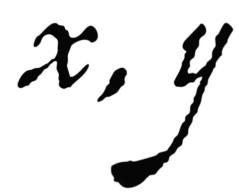The Facts on File Dictionary of Foreign Words and Phrases (Writers Reference) (77 page)
Read The Facts on File Dictionary of Foreign Words and Phrases (Writers Reference) Online
Authors: Martin H. Manser

vive la difference (veev la difarons)
FRENCH [long live the difference]
interjection long live the difference
(usually celebrating the differences
between the two sexes).
vixit (viksit) LATIN [he/she lived]
verb he/she lived (inscribed on tombstones before the deceased person's
dates).
ViZ. See VIDELICET.
vodka (vodka) RUSSIAN [from voda
water] noun a strong, colorless
liquor made from a mash of rye,
wheat, other cereals, or potatoes.
vogue (VOg) FRENCH [style, fashion,
ultimately from voguer to row (origi nally a reference to rowing styles)]
noun popularity, fashion, style, or
something that is recognized as being
currently popular or in fashion: "Mr.
Trabb then bent over number four, and in a
sort of deferential confidence recommended
it to me as a light article for summer wear,
an article much in vogue among the nobility and gentry.. " (Charles Dickens,
Great Expectations, 1860-61).
voila (vwalah), voila FRENCH [see
there, there it is] interjection there!
(expression drawing attention to something just completed or revealed):
"`Voila!' she exclaimed as she whipped the
cloth off the finished cake"
voir dire (vwar deer) FRENCH [to
speak the truth] noun phrase (in law)
a preliminary examination of a witness or juror to establish their competency to take part in a case; may
also refer to an oath taken by a witness or juror that they will speak the
truth.
vol-au-vent (vol-o-von , Vol-a-
von(g)) FRENCH [flight in the wind]
noun a small round pastry shell filled
with meat, fish, or seafood in sauce
(served hot or cold): "The guests will be
offered champagne cocktails and vol-auvents on the terrace."
volens (volenz) LATIN [willing] adjective (in law) consenting (usuall), to
the risk of injury).
volente Deo (volentee do) LATIN
[God willing] adverb phrase God
willing.
Volk (folk), Volk AFRIKAANS [from
Dutch volk people, race] noun the
people (often referring specifically
to the Afrikaner population of South
Africa or to the German nation during the Nazi period).
volte-face (volt faS) FRENCH [from
Italian voltafaccia about-face, from
voltare to turn] noun an about-face,
a reversal in policy, opinion, or attitude: "The press attacked this apparent
volte face in government policy."
vomitorium (vomitoreehm) LATIN
[neuter of vomitorius vomitory (referring to the disgorging of spectators)]
noun (plural vomitoria, vomitoreea)
a passage or other entrance leading to
or from the seats in an amphitheater,
stadium, or theater.
voodoo (voodoo), Vodun LOUISIANA
CREOLE [from voodou, itself probably from Ewe vodu demon, guardian
spirit] noun a folk religion of Haiti
derived ultimately from African polytheism and ancestor worship; may
also refer to a spell, charm, or hex,
or to black magic practices in general.
-adjective of or relating to such worship or rituals, or to black magic in
general: "The voodoo cult continues to
flourish despite the condemnation of local
churches."
Voortreldcer (vortrekar) AFRIKAANS
[from voor before and trehhen to trek]
noun a Boer pioneer, especially one
of the South African settlers of Dutch
descent who joined the Great Trek of
1838.
vorlage (forlahga) GERMAN [forward
position] noun (plural vorlages or
vorlagen, forlahgan) the position
assumed by a skier, with the body
leaning forward but with the heels
still resting on the skis.
vortex (vorteks) LATIN [whirlpool]
noun (plural vortexes, vorteksez, or
vortices, vortakeez) a mass of particles, fluid, or vapor revolving about
an axis; may also refer to any scene
of frenetic activity or to anything
else resembling a whirlpool or eddy:
"Now his imagination spun about the
hand as about the edge of a vortex; but
still he made no effort to draw nearer."
(Edith Wharton, The Age of Innocence,
1920).
voussoir (vuuswahr) FRENCH [from
Latin volvere to roll or turn] noun (in
architecture) a wedge-shaped stone
used in building the curved part of
an arch.
vox populi (voks pro),ooli, voks
proyoolee, voks proglee) LATIN [voice
of the people] noun phrase popular
sentiment, general opinion.
vox populi, vox dei (woks pop),oolee
voks wee) LATIN [voice of the people,
voice of God] interjection phrase "the
voice of the people is the voice of
God," an ancient proverb.
voyeur (voier) FRENCH [one who
sees, from voir to see] noun a person
who obtains sexual gratification from
clandestine observation of sexual
activity; may also refer to any person
who probes into the private affairs of
others: "The accusation that the professor was a secret voyeur caused considerable
unrest among parents of students at the
college."
Vs. See VERSUS.
V.S. See VIDE SUPRA.
V.V. See VICE VERSA; VIVA VOCE.

wadi (wodee) ARABIC [from wadiy
river bed, valley] noun a shallow
depression in a desert region, or the
bed or a stream or river that is dry at
certain times of year: "The rain filled
the wadi and within minutes the landscape
was transformed."
wagon-lit (vagon(g)-lee) FRENCH [from
wagon railroad car and lit bed] noun
(plural wagon-lits or wagons-lits,
vagon(g)-lee, vagon(g)-leez) a railroad sleeping car (usually referring
to the rail systems of France or other
continental European countries).
waldsterben (valtshterban) GERMAN
[from Wald forest and sterben to die]
noun (in ecology) the widespread
disease and death of forest trees,
believed to be the result of air pollution, first observed in central Europe
in the 1970s.
wallah (wola), walla HINDI [one in
charge, from Sanskrit pala protector]
noun a person who is associated
with a particular job or other activ ity (typically a relatively low-ranking
servant).
Walpurgisnacht (valergasnakt) GERMAN [Walpurgis Night, named after
the English St. Walburga (died 779)]
noun (in German-speaking countries) the eve of May Day, when
witches are reputed to assemble for a
secret Sabbath each year; occasionally
also used to refer to any nightmarish
or orgiastic situation.
wampum (wompdm) ALGONQUIAN
[abbreviated form of wampumpeag,
from wampan white and api string]
noun strings of beads and polished
shells as formerly used as money
by native Americans and hence, by
extension, money in general: "Had she
never worn that painted robe before? Mas it
the first time that these strings of wampum
had ever rattled upon her neck and arms?"
(Oliver Wendell Holmes, The Guardian Angel, 1867).
wanderjahr (vondayahr), Wanderjahr GERMAN [wander year, from
wander wander and Jahr year] noun (plural wanderjahrs or wanderjahre,
vondayahra) a year of wandering
or travel (usually referring to one
undertaken by a young person or
apprentice).
wanderlust (wondarlast) GERMAN
[desire for wandering, from wandern
to wander and Lust desire] noun an
enthusiasm for wandering or travel:
"Her father was periodically seized with
a wanderlust that took the family around
the world."
wasabi (wos5bee) JAPANESE noun
(in Japanese cuisine) a pungent paste
resembling horseradish in flavor, prepared from the thick green root of
an Asian plant and often served as a
condiment with raw fish: "I always have
wasabi with my sushi and noodles."
wazir (w2Zee5r) ARABIC [helper] noun
a vizier, a high-ranking state official of
the Ottoman Empire.
Wehrmacht (vairmakt) GERMAN
[defense force] noun the German
armed forces (specifically relating
to the German army in the years
1935-45).
weltanschauung (veltanshowan(g)),
Weltanschauung GERMAN [world
view, from Welt world and Anschauung
view] noun (plural weltanschauungs
or weltanschauungen, veltanshowanan) a comprehensive view of the
world, a philosophical viewpoint that
encompasses the whole of world history or civilization: "These ideas were
slowly transformed over the years into a
weltanschauung that became the old man's
gospel and creed."
weltpolitik (veltpolitik), Weltpolitik
GERMAN [world politics] noun international politics or policy: "The journal
was full of opinions about the lastest developments in westpolitik."
weltschmerz (veltshmerts), Weltschemrz GERMAN [world pain] noun
apathy or mental distress at the state of
the world; also used more generally to
refer to any mood of sentimental yearning or sadness: "I wonder----' Carol was
plunged back into last night's JVeltschmerz.
7 wonder if these farmers aren't bigger than
we are?"' (Sinclair Lewis, Main Street,
1920).
westpolitik (vestpolitik), Westpolitik
GERMAN [west policy] noun the
policy of former communist eastern European countries toward
increased political and trading links
with Western nations: "The progress of
westpolitik was slow at first but gathered
pace as individual governments began to
realize the opportunities for economic
advancement."
wickiup (wikeeap), wickyup ALGONQUIAN [from wikiyapi lodge, dwelling]
noun a form of temporary wigwamlike hut or shelter made of brushwood (as used originally by nomadic Native
Americans of the West and Southwest
United States): "Ten steps away was a
little wickiup, a dim and formless shelter
of rags and old horse-blankets, a dull
light showing through its chinks." (Mark
Twain, "Double-Barreled Detective
Story," 1902).
wiener schnitzel (veenar shnitzal,
ween3r snitzdl) GERMAN [Viennese
cutlet] noun phrase (in German cuisine) a breaded veal cutlet or escalope.
wigwam (wigwam) ALGONQUIAN
[dwelling] noun a rough hut consisting of hides, mats, rush, or bark laid
over an arched framework of poles (as
used as temporary housing by native
Americans of the Great Lakes region):
"You can trim up to any extent, and be as
free and easy as squaws in a wigwam, for
this corner is set apart for you ladies and we
never cross the line uncle is drawing until
we ask leave." (Louisa May Alcott, Eight
Cousins, 1875).
wissenschaft (visenshaft), Wissenschaft GERMAN [knowledge, scholar ship] noun the pursuit of knowledge
or learning.
wok (wok) CHINESE [from wohk] noun
(in oriental cuisine) a deep bowlshaped frying pan.
wonton (wonton) CANTONESE [from
wahn-tan] noun (in Chinese cuisine)
a small pocket of dough with an appetizing filling (usually served in soup).
wunderbar (vandabahr) GERMAN
[wonderful] interjection wonderful!
excellent! great! 'adjective wonderful, excellent, great.
wunderkind (vandarlint, wandarkint),
Wunderkind GERMAN [wonder
child] noun (plural wunderkinds or
wunderkinder, vand5rkind5, wandarkinda) a child prodigy, a person
who excels at something while still
relatively young: "The young painter
quickly won recognition as a wunderkind
of the NewYork art scene."
wurst (werst, wersht), Wurst GERMAN
[mixture] noun (in German cuisine)
German or Austrian sausage.

xenophobia (zenafobeea,zeenafobeea)
GREEK [fear of foreign things, from
xenos stranger and phobos fear] noun
fear or hatred of foreigners: "These
writings illustrate how patriotism can be
transformed into xenophobia."
Yahweh (yhway), Yahveh (hvay)
HEBREW [from YHWH with added
vowels] noun a name for God, an
expansion of the four Hebrew letters
YHWH. See also TETRAGRAMMATON;
YHWH.
yakuza (yakooza) JAPANESE [gangster, from ya eight, ku nine and za
three (the lowest possible hand in
a Japanese gambling game)] noun
a member of a Japanese crime organization, a gangster involved in organized crime in Japan: "Frustrated by his
work as a lawyer's clerk, he dreamed of
becoming a yakuza."
yang (yang) CHINESE [sun, masculinity] noun (in Chinese philosophy)
the masculine principle in nature,
associated with heat, dryness, or
light.
yantra (tra) SANSKRIT [supporter,
fastener, from yam to hold, to support] noun a geometric design used
as an aid in meditation.
yarmulke (yhmaka), yarmelke YIDDISH [from Polish jarmulka and Ukrainianyarmulka skullcap, probably from
Turkish yaflmurluk rainwear] noun
a prayer cap of the type traditionally
worn by male Orthodox Jews.
